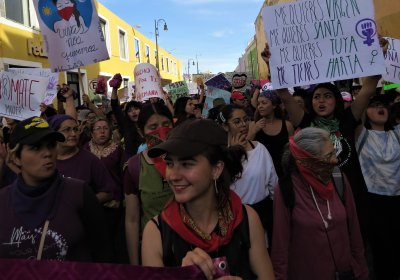Thousands protested across Peru against rising violence against women, police culpability and government inaction, reports Ben Radford. The marches were organised as part of the International Day for the Elimination of Violence against Women, which is marked on November 25.
gender violence
Isaac Nellist spoke with Indian student activist Ipil Monica Baski about the protests breaking out across the country in response to the rape and murder of a student doctor in Kolkata.
Geelong socialist councillor says councils must invest in communities, do more for the disadvantaged
Socialist councillor Sarah Hathway told an IWD function that the “most important” thing local council can do is to invest in the community and services, while doing more for the disadvantaged. Jacqui Kriz reports.
Life under COVID-19 just got scarier for many women. Isolation at home is not the safest choice for women trapped in abusive relationships, writes Chloe DS.
Women across Mexico refused to work, shop, do housework or be active on social media and mobilised in their thousands against violence and abuse on March 9, writes Tamara Pearson.
Panic and fomenting fear are well-tried methods of control, distraction and of shifting popular support towards the right, writes Tamara Pearson.
Public outrage has prevented the release on “good conduct” grounds of former mayor Antonio Sanchez, who was convicted for rape and murder in 1993
The Department of Justice (DOJ) announced the planned release of Sanchez on August 19, citing a 2013 law that allows for reducing jail time for “good conduct”.
However, according to the same law, “persons charged with heinous crimes”, such as Sanchez, are excluded from jail time reductions.
“I don’t see how reflecting on myself is going to stop women being bashed or murdered,” media personality Joe Hildebrand said in the wake of the murder of Courtney Herron in Melbourne on May 25.
The extreme violence directed at women are at the root of contemporary debates with the #NotAllMen faction which, by definition, declines to engage in thoughtful reflection.
As part of #16daysofactivism, a global campaign to highlight gender-based violence, Domestic Violence NSW (DV NSW) hosted a panel of journalists and rights advocates to address the difficulties in reporting sexual assault and domestic and family violence on November 29.
In the weeks since evidence of film producer Harvey Weinstein’s decades-long pattern of sexual abuse surfaced, millions of women, trans and gender nonconforming people, even men around the world, have exposed the scale of sexual violence in our society, using the #MeToo hashtag to tell their stories.
#MeToo set off a profound moment of collective bravery, which would have been impossible without the broad sense of solidarity and support for those coming forward.
Los Angeles streets were swarmed by the thousands of protesters on November 12 as Hollywood was taken by storm by a march inspired by the #MeToo Twitter campaign.
In support of victims of sexual assault and harassment, thousands of demonstrators marched, pausing in front of CNN’s headquarters.
One of the most important aspects of Venezuela’s pro-poor Bolivarian Revolution has been its promotion of women's empowerment through community organisation.
To get a sense of how this grassroots process of community organising is developing and the role women are playing in the process, we visited the Ataroa and Lomas de Leon communes as part of the Venezuela Analysis international solidarity delegation in late August.











